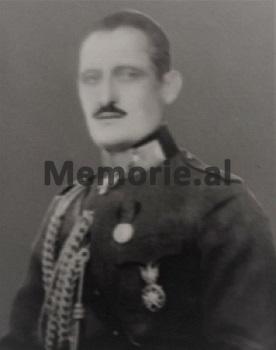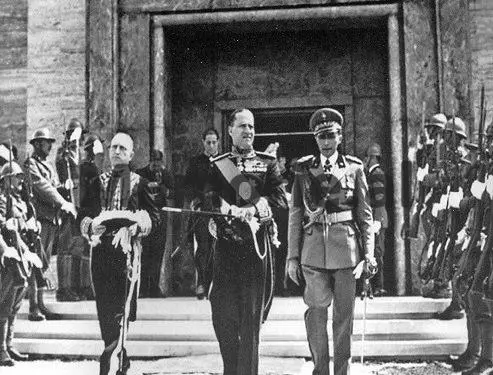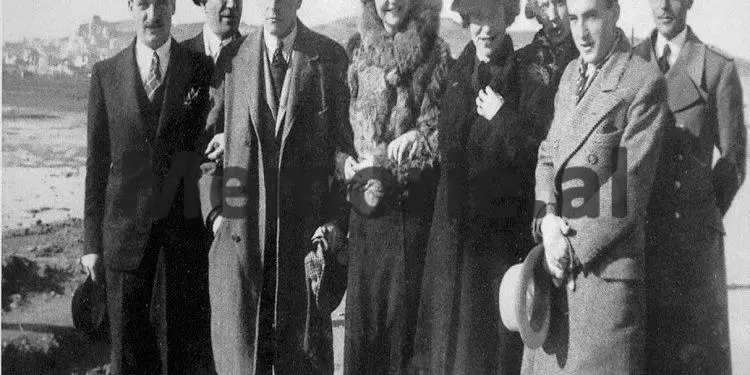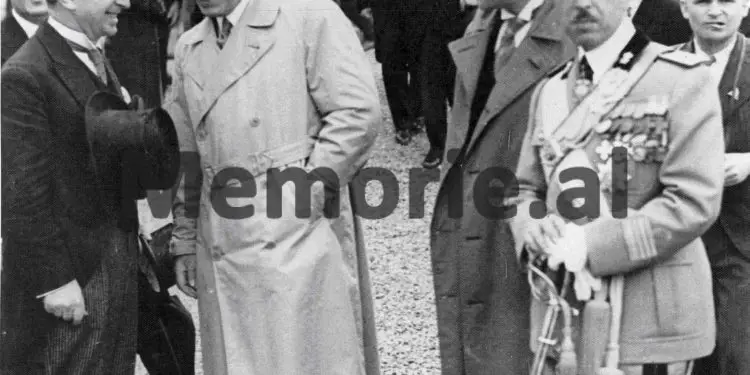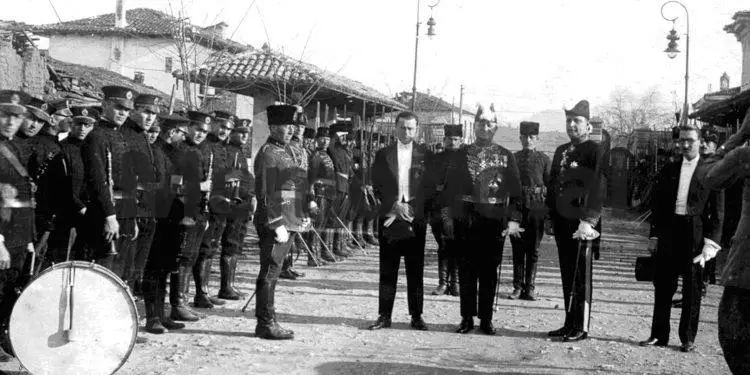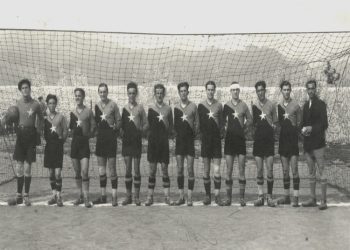By Hysen Selmani
Confessions of the former adjutant of King Zog, Colonel Hysen Selmani
Memorie.al / European and American press have often addressed the topic of the memories of the Albanian King, Zogu i-r, which he wrote and dictated during his exile from Albania. Considering the notes and syntheses that his assistant, Colonel Hysen Selmani, compiled over the years in his service, – always, next to the King of the Albanians, both at home and in exile, these notes, more or less with parts of detached, without strictly following the usual criteria of memoirs, and without having the definite, final form of an edition, they are prepared by Hysen Selmani himself, who has dedicated most of his life, as in Albania, as well as during the exile, serving the First Zog, the King of the Albanians.
These memories, with the approval of their Majesties – Leka I, King of the Albanians and Queen Geraldine of the Albanians, are being presented to the people in a new publishing format, in which, according to the advice of friends and experts of materials, colonel Hysen Selmani, stripped of any emotion and being impartial, presents the most important facts of the times related to relative events, avoiding any criticism of the people who participated in these events and who played an important role during the renaissance of the Albanian Nation.
The compilation of these notes naturally also includes the pre-Zogist period, starting before the League of Prizren, – from the revival of the spirit of the Albanian people, during the 19th century, until his death, in 1961.
The period that we are presenting to the public is one of the most complicated and one of the most unstable in history, not only for Albania, but also for the Balkans. Albania, like other Balkan states, after a long captivity under the Ottoman Empire, revives and starts working for its freedom and autonomy. It wants to find that political and state system, so that the history, the bloodshed and the sufferings, are guaranteed as they were guaranteed to other European countries. In order to realize these high goals and to achieve the aspirations of the whole people, from time to time Albanian men, from the League of Prizren, to that of Vlora, Durres and Lushnja, with weapons and feathers, sought to secure a homeland common, of all the sons of Albania.
The realization of such a work, written in blood and wet with tears, encountered great obstacles, because at first it found opposition: the European diplomacy of Berlin, and then in continuity it also encountered persistence – intrigues, conspiracies, uprisings and interventions of the neighboring states, which did not want a free, independent Albania, but its dismemberment, for their dark purposes, as an area of influence, to the detriment of a people. But this people, with weapons and with the immortal inherited national values of bravery, managed to humble and reject even the decisions of the Congress of Berlin, and give you a fistful of Serbian and Greek greed.
All this titanic act of blood and victory, against the invasions of the neighbors, against the Ottoman empires and against Europe, – in the diplomatic coalition against the rights of the Albanian people, constitutes the tragic history of Albania, for which Europe and Berlin were not interested. The Albanians, – without protection and in the midst of threats, – drafted with their own hands the League of Prizren, which is and remains the most beautiful and unique masterpiece that Europe has, during the 20th century. When a people sees that their land is being taken away, their houses are being burned, their relatives are being killed, they grab their weapons and create a state of violence and blood, through those sacred lands where their ancestors lived, for thousands of years.
This book presents these stories and their continuation during the 20th century. Here the reader finds the struggles, sacrifices and wars for freedom, as well as the intrigues and interests of the neighboring peoples, who, at any cost and by any means, sought to stop the historical evolution of a people who only wants to live free, in their own land sacred, inherited for thousands of years from his ancestors. Here is the summary of this history, from the League of Prizren to the proclamation of the Monarchy.
The first Zog, the King of the Albanians, born in the heart of Albania, since he was young, dreamed of the unification of the Albanian land, and the creation of a common homeland of the Albanians, for the Albanians, where they would be free and masters of their land. The work of the First Zog, like every work of a great man and a statesman, is presented in different stages: it goes from victories to retreats, it faces dangers without fear, it forgives the faults of its opponents, it calls on all to cooperate and then, know how to use the law, convincing us that the interest of the country, for him, was above everything. The First Zog, as is known, maneuvered on a glowing earth, both externally and internally. He sought to convince the Albanians first, by proposing the law and legislative norms, before taking any step.
In this way, the support given to the Congress of Durrës is explained, and the call for the Lushnja meeting also comes to light. It should not be forgotten that even during the First World War, he sought to convene a congress in Elbasan, where he tried to persuade the Austro-Hungarian government and its military representatives in Albania to allow its realization, which of course, it would change the page of Albania’s history, immediately after the conflict, until the Peace Conference in Paris, because the end of the War would find a stable and strong Albanian state in three quarters of the homeland , and would immediately include the areas occupied by the allies in the South of Albania.
King Zogu I continued in this idea, the union with the interest of all, for the unity of the Albanian state, with laws and administration inspired by the western world. This also explains his fight against the servility of the government of Durres, against Esat Toptan and his cliques, also against the organization of the War of Shkodra and Vlora, and against the Yugoslavs and the Italians, who wanted to conquer or keep them under their sovereignty, these two states, Albania.
What should be emphasized, and what stands out from these notes, is the behavior of King Zog, during the parliamentary period, where we have two political parties, freedom of speech and press, even though Zog himself had the majority in Parliament. Despite the fact that he, too, was able to suppress his opponents, who were preparing the uprising. He withdraws and leaves Albania, not for any other reason, but not to cause any bloodshed among the Albanians, because the enemies of Albania were waiting for this with open arms. King Zog did not give them this pleasure, which they prepared at the expense of Albania.
The facts then show that his return to Albania and the proclamation of the Republic, the suppression of any uprising, and the disappearance of any intrigue, external and internal, and the decision taken by the representatives of the people and the Albanian government, ended with the proclamation of Zog I, King of the Albanians, on September 1, 1928. These were the logical consequences of a life spent in the service of the homeland and of a situation that could not have a better and more logical conclusion than this result.
Zogu I, King of the Albanians during the five years he lived in Cannes and Paris, received and escorted all Albanian immigrants who always came to him, but also foreigners who were friends of Albania. He was tired, but he had a clear mind, about facts and characters. Until the last moments, he was interested in the issue of Albania and the Albanians.
King Zog, through his assistant, Colonel Hysen Selmani, leaves his notes to Albanians and foreigners. We are pleased to present these notes to the people, confident that we will contribute to the completion of history, not only Albanian, but also Balkan and European history, from the Congress of Berlin until 1961 lived and written by the Albanian people.
As I mentioned above, here you will find the most important facts, the circumstances and the political situation, not only Albanian, but also European, from the beginning until 1961, because the Albanian issue was once again on the diplomatic table. . Here, the interventions of the King, Zogu i-r, with the allies and respective governments, stand out, in favor of the independence and the contribution of the Albanian people, for the last victory, as well as for what belongs to the Albanian emigration, in the Western world.
The work of Zog I, the King of the Albanians, starts from his childhood and ends on his “death bed”, which happened in Paris on April 9, 1961.
These works are based on the notes left by King Zog I, as explained above.
Hysen Selmani
ALWAYS ITALIAN BEHAVIORS AGAINST THE SOVEREIGN INDEPENDENCE OF ALBANIA
As is known, the end of the Balkan War brought with it the declaration of independence by the Albanians at the Meeting of Vlora. This self-government, at the London Conference of 1912-1913, was recognized and solemnly guaranteed by the six Great Powers that constituted the Conference.
This self-government did not last long due to the intrigues and pushes of Italy, which thus at the beginning of the general war aimed to occupy the naval base of Vlora and Sazan, in order to dominate the Adriatic. Albania, after many efforts, from 1915 to 1920 under the hoof of the Italian army, was finally able to break this captivity, with the end of the War of Vlora, which resulted in the emptying of the Albanian land by the Italian Power and as conclusion of the will of the Albanian people shown to be capable of maintaining their independence and sovereignty.
The Conference of Ambassadors gathered in 1921 in Paris, restored and affirmed the existence of the independent and sovereign state of Albania, and as a result, the League of Nations solemnly accepted the independent Albanian state to be part of its members.
A policy decided by Italy, because in March 1922 it could make a small movement in Albania, which without delay was suppressed and disappeared by the Albanian nationalist government. The policy, which was decided by Italy, to destroy the Albanian independence and to enslave the Albanian people, came out twice more in 1921 and in 1926, but both of these uprisings prepared and directed by Italy were suppressed and disappeared without the slightest resistance from the will of the people.
The policy followed by Italy, in order to confess to the civilized world, on the stabilization of the regulated state, but with its dark thoughts, found no other way than that in the last month of 1927 it comes and offers the government Albanian a defensive alliance with completely identical conditions. The Albanian government, peace-loving and determined, that the achievement of the prosperity of the Albanian people will be possible only with a patient peace, and on the other hand remembering that with this alliance it could also serve the peace in the Balkans, and especially believing that Italy would abandon the former policy, always causing events to disturb the tranquility of the country. Thus the Albanian government signed the said treaty, which was also registered in the League of Nations.
The Albanian government has done everything possible to respect and implement the obligations derived from this treaty, but the policy inherited from the Palazzo Chigi consultation has not remained silent one way or another.
For one reason or another, to seek with their policy inherited from Machiavelli to achieve his goal and thus even in the years when the Alliance treaties were signed, they did not remain from time to time without clouding the calm sky of Albania with movements or conspiracies, whether local, such as that of Fier in 1935 and that of Delvina in 1937, which, without being realized, were developed and suppressed by the government.
The provocateurs of the Fier movement could escape from the grip of national justice only by finding the means of escape from the Italian ships, which were stationed in the port of Seman on the Albanian coast. Thus, the culprits were transported from here to Italy.
The Albanian government, as a representative of a small country, went through these events only with a measure for its own country, without fuss because its power did not reach to take other actions or initiatives, as it belonged.
Fascist politics, in its Parliament and in the discourses pronounced by them, on the one hand cheered for Albanian friendship; on the other hand, they prepared the last and decisive attack for the destruction of the freedom, independence and integrity of Albania.
As we have described above, an extensive conspiracy and with enormous financial assistance since the end of the summer of 1938 was drawn up and was being prepared with all the means of this conspiracy by the so-called Cmm. Giovanni Giro, was sent under the pretext of doing studies for an eventual organization of the sonship in Albania. The main purpose of this conspiracy was to destroy the life of King Zog of the Albanians, and in case this was not possible to be realized with an uprising to demand the occupation of Albania by the Italian army.
But this conspiracy, when it was preparing to take action, was announced to the Albanian Royal Government by the Archbishop of Shkodra Magr. Thaçi and by the Captain of Mirdita Gjon Marka Gjon, who affirmed of their own free will that Giovanni Giro, together with the Minister of Italy accredited in Albania, Jakomon, paying the Captain 6,000 napoleons of gold and told us that this plot against King Zog and Albania, preferred to be done in the first days of April, when the baby from the Queen would see the light and when the King would was very busy.
In addition, as we have mentioned above, that Murat Kaloshi and Myftar Kaloshi, who came to the Palace at night and declared to King Zog, that entire Giro had ordered from them, at Jak Koçi’s house, and the 5,000 napoleons that had been given to him.
When this plot was discovered, only with the report of the Albanians who had been called for its preparation, the Albanian Royal Government protested energetically with facts and documents to the Italian government, so that the Italian representative Jakomoni, after this discovery, left Tirana for Rome and left immediately.
These were the behaviors of fascist Italy, allied with guarantees and promises, which, as we described, shamelessly rushes a small people to prevent them from opening their eyes to freedom and independence and to its rapid progress. This is to reach the level of civilization with other countries, so this is fascist Italy.
General Zef Sereqi, returning from across the sea, talked long and wide about what existed in Italy, but not what was true, maybe he didn’t know, but when he met with them for the second time [before leaving for Rome . I found him much more upset about the situation. I only know one thing: a slogan between the King and Zefi was that in case no agreement is reached and Italy sends troops against Albania, Zefi would submit his resignation; this gave us to understand that Italy ordered land in Albania.
Only when I parted with him, at that moment, when he left for Rome, I saw that there was no hope of improvement and he repeated the same words to me saying that: “I have to do what is possible to avoid this danger. But in any case, my resignation means that all hope has been cut off with Italy and ordered to land in Albania”, – and that’s how we parted ways with Zefi and he left for Rome.
The situation immediately seemed to be becoming critical and all the signs were imminent for military measures that the Duchy would take against Albania, a friend and ally./Memorie.al





